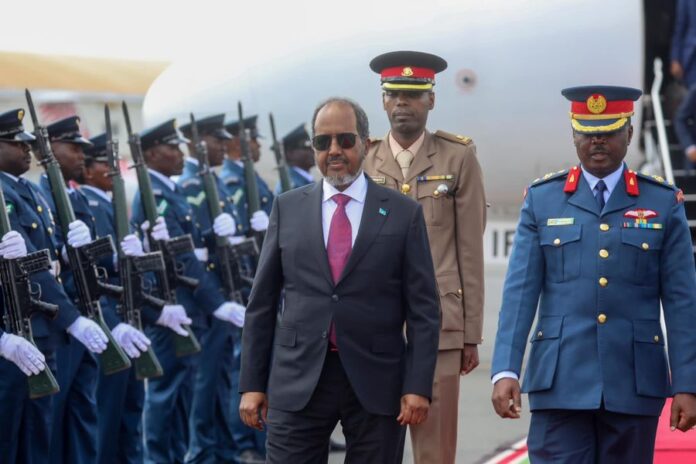NAIROBI, Kenya – Somalia’s President Hassan Sheikh Mohamud arrived in Nairobi for the sixth United Nations Environment Assembly (UNEA6).
In a statement on Wednesday, the Head of State at the summit will highlight Somalia’s unique environmental challenges.
“The challenges particularly will include the climate-induced humanitarian situation in the country by exploring ways to work collaboratively with global partners to build a sustainable future for Somalia,” the statement reads.
Additionally, President Sheikh will touch on the challenges hampering peace, stability, and sustainable development in the region.
He will also discuss how certain destabilising unilateral actions threaten to exacerbate the worsening situation.
Apart from the summit, President Sheikh will engage in bilateral side meetings with heads of state and government and other heads of delegations to strengthen ties and opportunities for cooperation on environmental issues.
The sixth session of the United Nations Environment Assembly began at the United Nations Environment Programme headquarters in Nairobi on Monday.
More than 5,000 delegates from the 193 United Nations are reported to be participating in the event.
Every two years, all 193 UN Member States convene to collectively address critical environmental challenges facing the planet.
UNEA was created in 2012, as an outcome of the UN Conference on Sustainable Development (Rio+20), held in Brazil.
Since its establishment, the Assembly has ushered in a new era of multilateralism with environmental issues given the same level of importance as such global concerns as peace security, and health.
Over the years, UNEA has approved important resolutions on topics such as combating illegal wildlife trafficking, protecting the environment in areas of armed conflict, and sustainable urban mobility, among others.
Due to the discussions at the Environment Assembly’s 2022 session, negotiations have begun on the first legally binding international instrument to end plastic pollution, which is expected to be completed by the end of 2024.
The central theme of UNEA-6 will be multilateral environmental agreements and how they can help overcome the triple planetary crisis of climate chaos, biodiversity loss and pollution.
Despite the socio-economic uncertainties that arose in the wake of the COVID-19 pandemic and the current growing geopolitical tensions, the last two years have been marked by important victories for environmental cooperation.
For instance, in 2022, the UN General Assembly recognized the universal human right to a clean, healthy and sustainable environment, opening space for constitutional and legal changes at the country levels in favour of the environment and humanity.
In June 2023, the 193 UN Member countries signed the so-called High Seas Treaty, to conserve marine biodiversity in areas beyond national jurisdictions.
Last November, a long-awaited agreement on ‘loss and damage’ financing for vulnerable countries hard-hit by climate change was announced at the UN climate conference, COP28.
The Star





